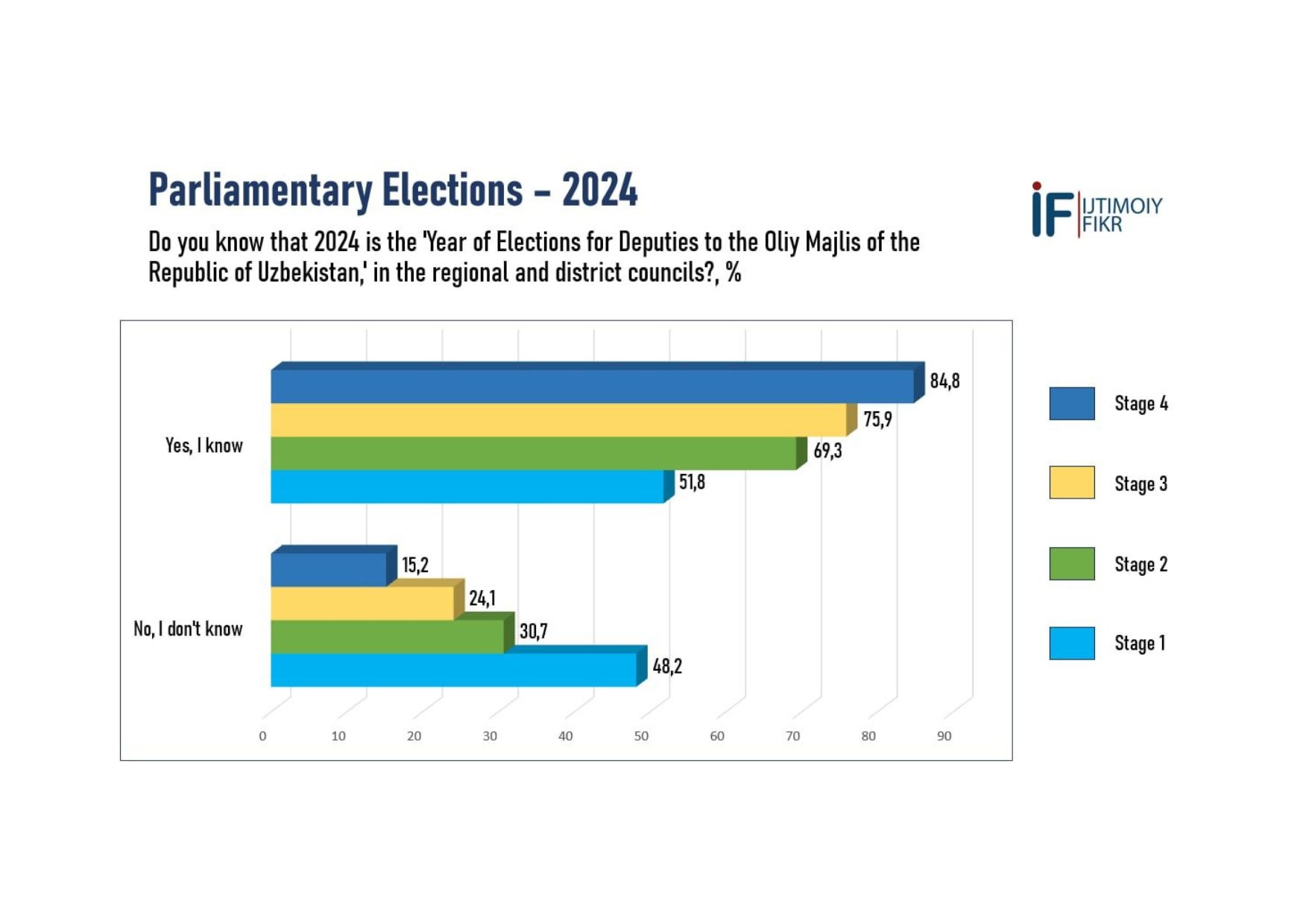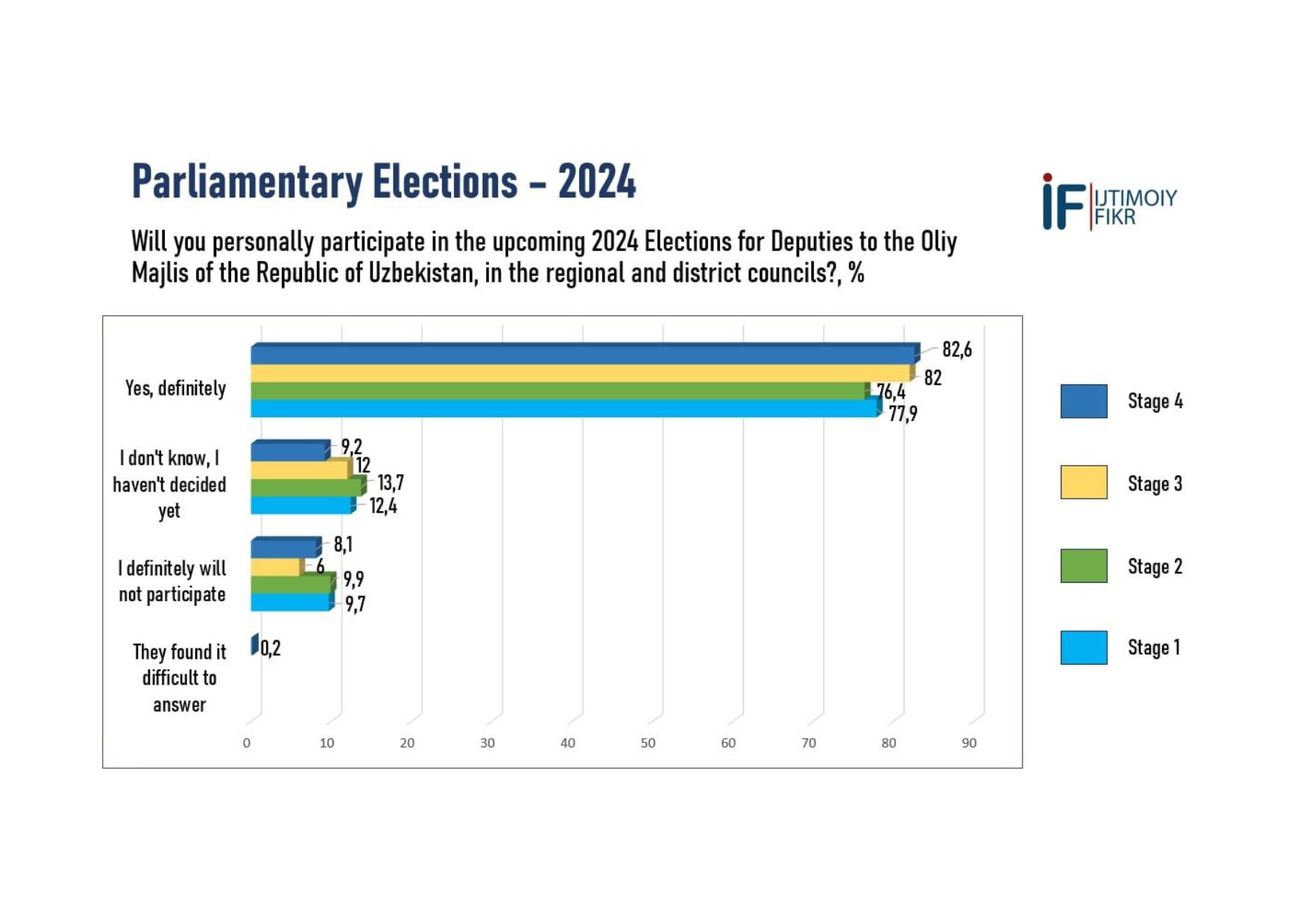22.10.2024
348
ELECTIONS TO THE OLIY MAJLIS AND NEW RULES OF THE ELECTORAL CYCLE
RCSPO "Ijtimoiy Fikr" has many years of experience in providing sociological support for election campaigns. Ahead of the elections for deputies of the Legislative Chamber of the Oliy Majlis of Uzbekistan and deputies of regional, city, and district councils, the Center is conducting comprehensive sociological studies aimed at analyzing citizens engagement in the political life of the country, identifying public awareness of the upcoming elections, and forecasting expected electoral activity.
In the comprehensive public opinion polls dedicated to the important political event scheduled for October 27 of this year, more than 4,000 people participated, representing all regions of the country urban and rural residents, men and women aged 18 and older, and individuals from various nationalities and social groups, employed in a wide range of fields and industries.
The public opinion surveys were conducted in four stages from August to October 2024.
The results of the surveys showed a steady increase in awareness of the upcoming elections. At the time of the last stage of the research, 84.8% of the country's citizens were aware that 2024 is the 'Year of Elections for Deputies to the Oliy Majlis of the Republic of Uzbekistan,' as well as to regional, city, and district councils."
"The upcoming parliamentary elections in 2024 differ from the previous elections in 2019. This year, the elections for deputies will be held based on a majoritarian-proportional (mixed) system. The formation of the new composition of the deputy corps will ensure representation of the interests of various social groups, which, in turn, has influenced citizens' understanding of the importance of participating in the elections.
Monitoring of the four waves of sociological surveys has shown a steady increase in the importance citizens place on personal participation in the upcoming elections. This indicator has steadily grown from 63.5% in the first research cycle to 71.6% in the last one.
The results of the conducted studies allow us to conclude that the majority of the electorate is approaching the elections consciously, clearly understanding that they have a real opportunity to influence the future course of reforms in the country and to participate in the process of governing the state.
The survey recorded a rather high level of public interest in the political agenda, with a rise in electoral activity. Uzbeks are showing increased attention to state affairs and are eager to actively participate in the upcoming voting. It is worth noting that the closer the voting date, the greater the percentage of those willing to participate—while in the first stage (August) 77.9% of Uzbeks expressed their intention to participate in the elections, by the last survey (October), this figure had increased to 82.6%."
"The conducted public opinion survey showed that there is a fairly clear understanding in the public consciousness of which issues the electoral programs of political parties should focus on. The main components of the parties' electoral campaigns should address issues such as the quality and accessibility of education (56.6%), social protection and support for the population (42.2%), economic strategies for the country's further development, issues related to improving the tax system, reducing tax rates to support the development of small and medium-sized businesses, ways to increase the real incomes of the population, and the development of the industrial sector, including based on modern technologies and the principles of a 'green economy' (30.7%).
Other important aspects of the electoral campaign should include the development of agriculture (23.4%), ensuring the rights and freedoms of citizens (19.3%), solving energy problems (18.3%), and improving infrastructure (18.0%).
The results of the study on the socio-political situation ahead of the elections for deputies of the Legislative Chamber of the Oliy Majlis of Uzbekistan and deputies of regional, city, and district councils indicate growing electoral activity and predict a high voter turnout on election day."



